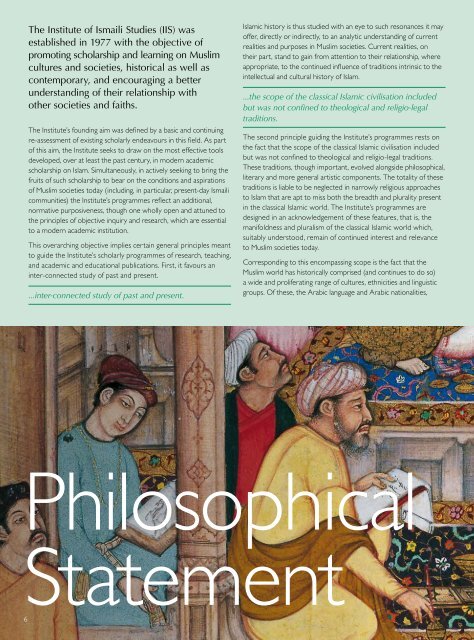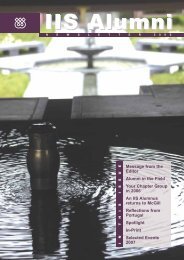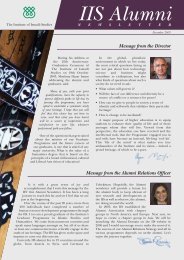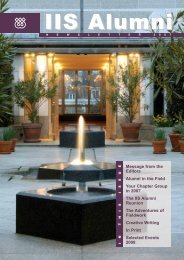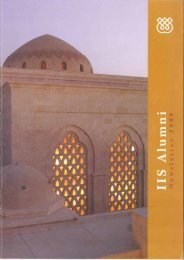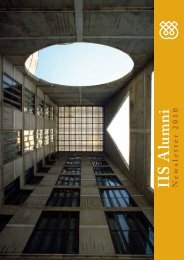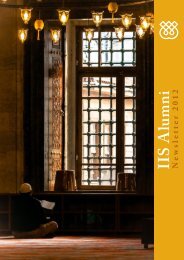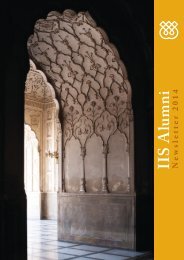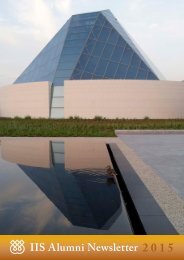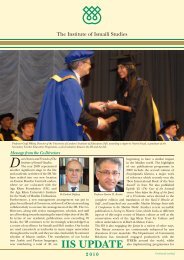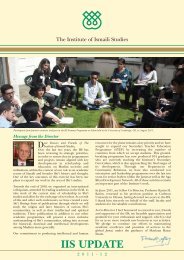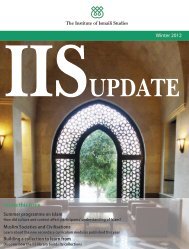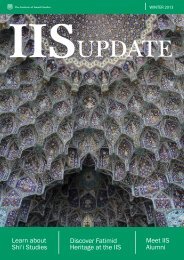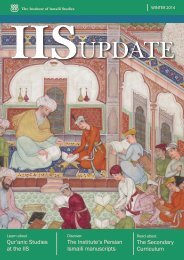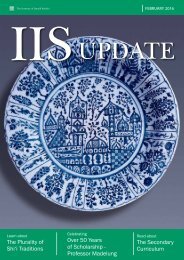IIS Brochure_Final
Create successful ePaper yourself
Turn your PDF publications into a flip-book with our unique Google optimized e-Paper software.
The Institute of Ismaili Studies (<strong>IIS</strong>) was<br />
established in 1977 with the objective of<br />
promoting scholarship and learning on Muslim<br />
cultures and societies, historical as well as<br />
contemporary, and encouraging a better<br />
understanding of their relationship with<br />
other societies and faiths.<br />
The Institute’s founding aim was defined by a basic and continuing<br />
re-assessment of existing scholarly endeavours in this field. As part<br />
of this aim, the Institute seeks to draw on the most effective tools<br />
developed, over at least the past century, in modern academic<br />
scholarship on Islam. Simultaneously, in actively seeking to bring the<br />
fruits of such scholarship to bear on the conditions and aspirations<br />
of Muslim societies today (including, in particular, present-day Ismaili<br />
communities) the Institute’s programmes reflect an additional,<br />
normative purposiveness, though one wholly open and attuned to<br />
the principles of objective inquiry and research, which are essential<br />
to a modern academic institution.<br />
This overarching objective implies certain general principles meant<br />
to guide the Institute’s scholarly programmes of research, teaching,<br />
and academic and educational publications. First, it favours an<br />
inter-connected study of past and present.<br />
...inter-connected study of past and present.<br />
Islamic history is thus studied with an eye to such resonances it may<br />
offer, directly or indirectly, to an analytic understanding of current<br />
realities and purposes in Muslim societies. Current realities, on<br />
their part, stand to gain from attention to their relationship, where<br />
appropriate, to the continued influence of traditions intrinsic to the<br />
intellectual and cultural history of Islam.<br />
...the scope of the classical Islamic civilisation included<br />
but was not confined to theological and religio-legal<br />
traditions.<br />
The second principle guiding the Institute’s programmes rests on<br />
the fact that the scope of the classical Islamic civilisation included<br />
but was not confined to theological and religio-legal traditions.<br />
These traditions, though important, evolved alongside philosophical,<br />
literary and more general artistic components. The totality of these<br />
traditions is liable to be neglected in narrowly religious approaches<br />
to Islam that are apt to miss both the breadth and plurality present<br />
in the classical Islamic world. The Institute’s programmes are<br />
designed in an acknowledgement of these features, that is, the<br />
manifoldness and pluralism of the classical Islamic world which,<br />
suitably understood, remain of continued interest and relevance<br />
to Muslim societies today.<br />
Corresponding to this encompassing scope is the fact that the<br />
Muslim world has historically comprised (and continues to do so)<br />
a wide and proliferating range of cultures, ethnicities and linguistic<br />
groups. Of these, the Arabic language and Arabic nationalities,<br />
Philosophical<br />
Statement<br />
6


